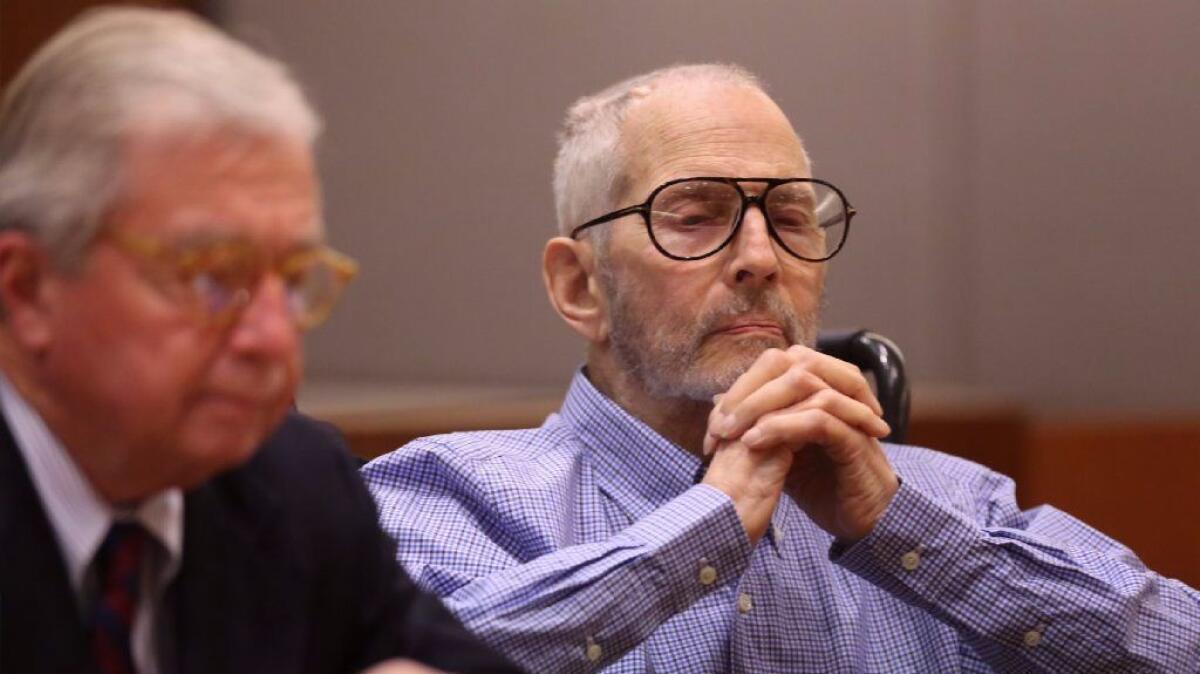Retired NYPD detective testifies he believes Durst responsible for missing wife’s death

- Share via
The retired New York police detective who led the investigation into the 1982 disappearance of Robert Durst’s wife testified Wednesday that he quickly grew suspicious of the millionaire and eventually came to believe that he killed her.
“It would be hard to believe otherwise,” said Michael Struk, who testified in a courtroom in Los Angeles, where Durst is charged in a separate case.
The eccentric real estate magnate stands accused of shooting his best friend, Susan Berman inside her Benedict Canyon home in 2000 — a slaying that prosecutors argue was motivated by his desire to silence her for her knowledge of the disappearance of his wife, Kathleen.
The detective, who was called to testify by the defense, said Tuesday that he was “comfortable” that authorities had done everything they could to solve the mystery. Kathleen Durst’s body was never recovered and criminal charges weren’t filed against her husband in New York.
But under cross-examination Wednesday, Struk testified that while no arrest was made in New York, he did suspect the millionaire.
Durst, 74, is unlikely to go to trial before 2018. However, a judge has allowed attorneys to videotape early testimony from older witnesses in danger of dying before the case is presented to jurors. While prosecutors have called more than a dozen witnesses to the stand in recent months, Struk is the first witness called by the defense.
The detective said he remembered Durst walking into the New York Police Department’s 20th Precinct station in Manhattan to report his wife missing. It was Feb. 5, 1982 — five days after Durst said he saw his wife for the last time in Westchester County, N.Y., after putting her on a Manhattan-bound train.
Prosecutors then played a clip of Struk being interviewed in 2011 by producers of “The Jinx,” a six-part HBO documentary about Durst. During the interview, Struk said Durst showed no emotion while reporting his wife’s disappearance.
“It was like he was in a deli ordering a hero sandwich,” Struk said during the interview. The retired detective also told producers that while reporting his wife missing, Durst had mentioned his father, Seymour, a power broker in New York real estate circles. Struk testified that he believed Durst was trying to impress him with the reference.
Later in the hearing, prosecutors displayed a missing-persons report that Struk wrote after Durst reported Kathleen missing. Durst wasn’t initially concerned about his wife, Struk wrote, as she often stayed overnight at the Albert Einstein College of Medicine, where she was enrolled, several days at a time. According to the report, Durst told the detective the couple had few marital difficulties.
But Struk testified that he came to doubt that characterization of the marriage after speaking with a fellow medical student who told him Kathleen spoke of many marital problems, including “her husband striking her” and “mental cruelty.”
The prosecutor asked if that had “raised his antennae.”
“Yes,” the detective responded.
Although he grew suspicious of Durst, Struk testified that it was a tough case because he believed that Kathleen had been killed outside the city and there was no actual crime scene within the NYPD’s jurisdiction. Beyond that, he said, authorities were saddled because they had statements from people saying they had seen Kathleen in Manhattan or spoken to her by phone after Durst reported putting her on the train.
On Tuesday, Struk zealously denied accusations made in a recent lawsuit filed on behalf of Kathleen Durst’s family that New York police sought to protect her husband during their investigation.
“Until you walk in my shoes, don’t spit in my face,” Struk said.
When asked by a defense attorney if he’d done anything to cover up for Durst in his wife’s disappearance, the detective choked up and said, “That’s silly.”
That testimony could foreshadow an issue lawyers will likely focus on at trial — the thoroughness of the New York investigation in the 1980s and whether Durst evaded arrest for a crime he committed.
Durst’s attorney, Dick DeGuerin, argued that Struk did a good job investigating the case, asserting that Durst was never arrested because the evidence didn’t point toward his guilt. The defense argument could undermine a motive for Durst to have killed Berman.
But Deputy Dist. Atty. John Lewin sharply disagreed, saying, “There was no great investigation.”
Struk testified that in retrospect he would have done some things differently. It was a mistake, he conceded, not to ask more questions of a medical school dean who at the time told detectives he got a call from Kathleen on Feb. 1, 1982. Struk said he didn’t recall asking the dean how he recognized Kathleen’s voice or how many times they’d spoken by phone before.
Also, the detective said, it would have been a “good thing” for authorities to conduct a much more detailed search of the house in South Salem — a hamlet in Westchester County where Durst and his wife sometimes spent weekends.
Durst, who has pleaded not guilty, was arrested at a New Orleans hotel in connection with Berman’s slaying on March 14, 2015. Inside his hotel room, police say, they found a .38 revolver, stacks of cash and an old-man mask.
The eccentric millionaire was arrested a day before the finale of “The Jinx,” in which the real estate scion mumbles, “What the hell did I do? Killed them all, of course.”
Some interpreted his comments, which were captured on a hot microphone during a bathroom break, to be a confession to three killings — those of Berman and his wife and the fatal shooting of Morris Black, a neighbor in Texas.
In the Texas case, Durst argued at trial that the gun fired while he was defending himself during a struggle with Black. He admitted to dismembering the body and dumping the parts in Galveston Bay, but jurors acquitted him of murder.
Times staff writer Makeda Easter contributed to this report.
For more news from the Los Angeles County courts, follow me on Twitter: @marisagerber
More to Read
Sign up for Essential California
The most important California stories and recommendations in your inbox every morning.
You may occasionally receive promotional content from the Los Angeles Times.











